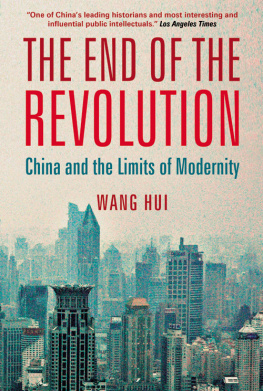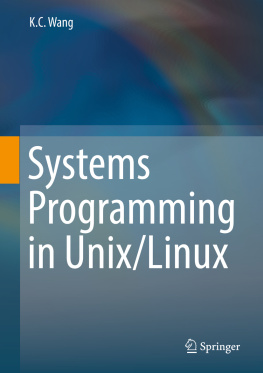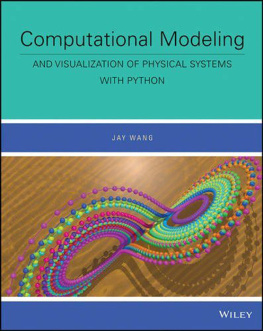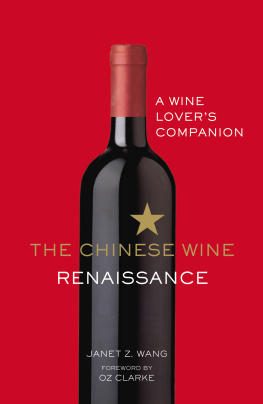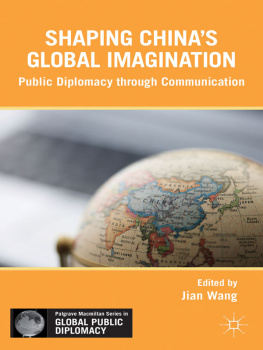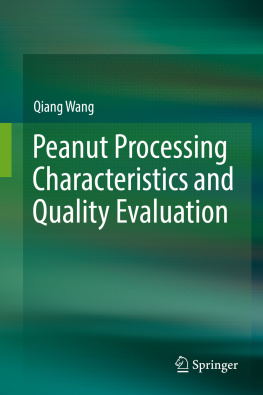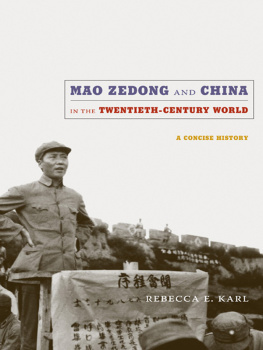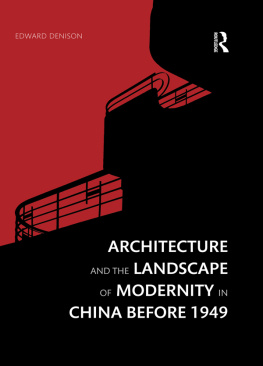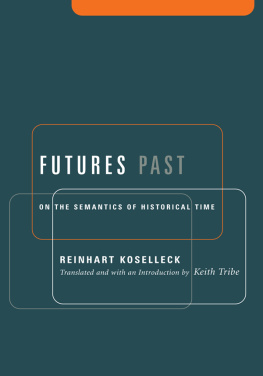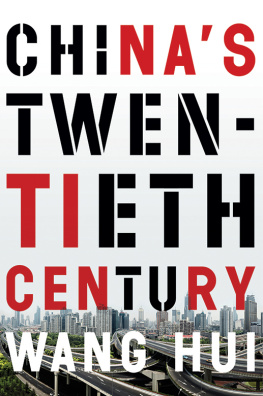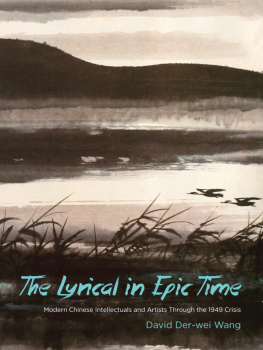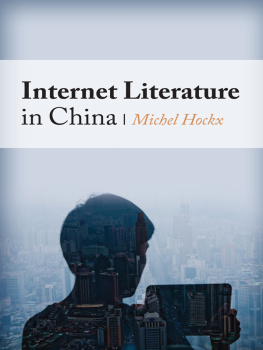
WANG HUI is a Professor of Chinese Language and Literature at Tsinghua University in Beijing and the former editor of Dushu, Chinas most influential literary journal. He participated in the Tiananmen protest of 1989 and is the author of The Rise of Modern Chinese Thought.

First published by Verso 2009
This paperback edition first published by Verso 2011
The collection Verso 2011
Translation the translators 2009
All rights reserved
The moral rights of the author have been asserted
1 3 5 7 9 10 8 6 4 2
Verso
UK: 6 Meard Street, London W1F 0EG
US: 20 Jay Street, Suite 1010, Brooklyn, NY 11201
www.versobooks.com
Verso is the imprint of New Left Books
e-Book ISBN-13: 978-1-84467-813-6
British Library Cataloguing in Publication Data
A catalogue record for this book is available from the British Library
Library of Congress Cataloging-in-Publication Data
A catalog record for this book is available from the Library of Congress
Typeset in Fournier by Hewer Text UK Ltd, Edinburgh
Printed in the US by Maple Vail
Contents
Foreword to the English Edition by Rebecca Karl
In the mid 1990s, a book entitled Gaobie Geming (Farewell to Revolution) was published in Hong Kong. It was received in China with great acclaim. Written by a well-known philosopher, Li Zehou, and a famous literary critic, Liu Zaifu, the farewell to which the books title points represents a deliberate turn away from the revolutionary twentieth century towards an indefinite but, to them, more promising new horizon. Yet the book was not merely the announcement of a personal turn. Rather, it explicitly called for the abandonment of revolutionary understandings of history and philosophy in favor of an alternative and less radical critical approach to the historico-philosophical problems of modern China. A condemnation of twentieth-century Chinese intellectual and political history for its supposed fetishizing of revolutionary solutions to crises, the book quickly became a standard-bearer in the intellectual and political world in China and in Chinese Studies circles globally for its call to completely de-radicalize thought, practice and political-social ambition. In this sense, Farewell to Revolution both summed up an ongoing trend and gave sanction to its further entrenchment and development in the intellectual and political worlds of Chinas 1990s. It was a book of the zeitgeist.
Wang Huis End of the Revolution is an entirely different type of critical consideration. Instead of a willful call to abandon revolutionafter all, revolution was a central aspect of Chinas and the global modern experienceWangs collection of essays and interviews presents a sober and yet impassioned historical accounting for Chinas 1980s and beyond, as seen from the vantage of its many twentieth-century revolutionary encounters and experiences. In this perspective, the contemporary era does indeed mark the end to what French philosopher Alain Badiou
The difference between the farewell of the first type and Wangs consideration turns on the different interpretive weights given to revolution as a historical form of social politics in the context of a global economy. For Wang Hui, revolution is and was intimately intertwined with the century-long debate and struggle in China and globally over the relationship between modernization and democracy. That is, if we understand modernization and democracy as two important poles of political and intellectual struggle of the twentieth century, revolutionary politics can be seen as the solution chosen in Chinas twentieth century to help resolve the contradiction between them. In this understanding, Wang Huis intellectual and academic approach is deeply embedded in the historical problem presented to and in China by the arrival in the late nineteenth century of the most undemocratic form of global modernizationism: the form known as capitalist-imperialism. This is the problem that Wang Hui names modernity. It is from this historical premise that his analysis of the contemporary moment begins. In this sense, according to Wang, from the late nineteenth century onwards, the multiple Chinese debates about China in the world were inextricably connected to global debates about economic development and socio-political forms, including prominently the debates over socialism as a form of anti-capitalist modernity and democracy. Indeed, these are debates that underpin the core content of modern global and Chinese intellectual and political explorations over the past century.
However, the past two decadesfrom the post-1989 era through to the recent celebration of the sixtieth anniversary of the Chinese Communist Partys accession to power (October 1, 2009)has seen the absolute triumph of modernizationnow defined exclusively as economic developmentalismover democracy, understood as a potentially broad social politics. The historical struggle between them appears to have been abandoned, and along with it the attempt to think and practice politics as a form of broad social democracy. This is what Wang despairingly calls the depoliticization of politics. Indeed, for Wangs critics in China and elsewhere, revolution is and always has been about mob ruleor uncontrolled radical social and political excessa form of politics leading to extended periods during which both modernization and social order suffered. According to these critics, then, it is best to abandon aspirations towards broad social democracy, to tame the mob through consumerist modernization (economic developmentalism) and nationalist patriotism, the two poles of social participation now identified as the only possible forms of mass political practice.
Broadly speaking, this narrowing of political and imaginative horizons is the target of much of Wang Huis work, as seen in this collection of essays and interviews. Yet Wangs is no nostalgia for revolutionfar from it. Nevertheless, as the pieces collected here make clear, Wang insists on engaging with the failed potential of revolution as a democratic form that transcends and is more substantive than the market and its neoliberal nostrums calling for individual responsibility. He is unwilling to give up on the prospects of democracy by handing its discourse and practice over to the uneven and unequal workings of the contemporary Chinese market-state-intellectual complex.
The combination of sober critical assessment of the present and the continuing hope for a more democratic future lends Wangs workhere and elsewherepotent force and a lightning-rod quality for his intellectual and political opponents in China. For, mild-mannered and fair-tongued as Wang Hui is as an individual, and as full of honesty and integrity as he is in his intellectual and personal practice, his insistence that history matters and that the problem of modernity is the problem of mass democracy (in its many potential forms) and not merely of economic development seems to irk his critics in unusual ways. The sharpness of the attacks on him reflect the felt threat he poses to the desired hegemony of the market-state-intellectual complex, which would rather dehistoricize the present by erasing the possibilities presented in the past, and thereby pretend that the present and future offer only one solution: their solution. Wang Huis conviction, that a pressing issue of strikes these many creators and conservators of the contemporary Chinese and global order as a rabble-rousing call to the mob to overthrow the hard-won system of privilege and profit established since the early 1990s in China. It is against such a position that Wang Hui, in his public as well as in his denser academic writings, struggles to find an historical ground of logic and analysis that could point to a more socially democratic way forward.
Next page
